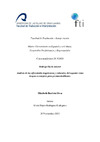Identificador persistente para citar o vincular este elemento:
https://accedacris.ulpgc.es/jspui/handle/10553/77208
| Campo DC | Valor | idioma |
|---|---|---|
| dc.contributor.advisor | Rodríguez Rodríguez, María Nayra | es |
| dc.contributor.author | Bautista Mesa, Elizabet | es |
| dc.date.accessioned | 2021-01-15T18:03:19Z | - |
| dc.date.available | 2021-01-15T18:03:19Z | - |
| dc.date.issued | 2020 | - |
| dc.identifier.uri | https://accedacris.ulpgc.es/handle/10553/77208 | - |
| dc.description.abstract | El presente estudio pretende abarcar la enseñanza/aprendizaje de ELE en alemanes desde una perspectiva holística, es decir, teniendo en cuenta todos los factores que influyen en este proceso. De manera que se tendrán en cuenta los errores más frecuentes de la gramática y se contrastarán las metodologías utilizadas para enseñar idiomas tanto en España como en Alemania, además de las diferencias de ambas culturas desde el punto de vista social. Para ello, nos fundamentaremos en estudios realizados con anterioridad por diferentes autores en donde se tratarán diversas teorías. Contrastaremos las dos instituciones más relevantes en la enseñanza de ambos países: Institutos Cervantes y Goethe, al igual que enfatizaremos en la interlengua del hablante. Nuestro objetivo es resolver los errores que se cometen comúnmente en este tipo de alumnos y entender el proceso de aprendizaje no solo desde el punto de vista lingüístico, sino también cultural. Con respecto a nuestra metodología, por una parte, consultaremos los repositorios bibliográficos, tanto impresos como virtuales. Y, por otro lado, realizaremos una programación ad hoc para erradicar las principales dificultades lingüísticas y culturales. Tendremos en cuenta así el Plan Curricular del Instituto Cervantes, el Marco Común Europeo de Referencia para lenguas y manuales especializados en esta materia como es el caso de Dificultades del español para hablantes de alemán de María Esther Barros Díez. | en_US |
| dc.description.abstract | This study aims to cover the teaching/learning of Spanish as a foreign language in Germany from a holistic perspective, i.e. taking into account all the factors that influence this process. Thus, the most frequent errors in grammar will be taken into account and the methodologies used to teach languages in both Spain and Germany will be contrasted, as well as the differences between both cultures from a social point of view. In order to do this, we will rely on studies carried out previously by different authors in which various theories will be discussed. We will contrast the two most relevant institutions in the teaching of both countries: Cervantes Institute and Goethe Institute, as well as emphasizing the interlanguage of the speaker.Our aim is to resolve the mistakes commonly made by this type of student and to understand the learning process not only from a linguistic but also from a cultural point of view. With regard to our methodology, on the one hand, we will consult bibliographical repositories, both printed and virtual. And, on the other hand, we will develop an ad hoc programme to eradicate the main linguistic and cultural difficulties. In this way, we will take into account the Cervantes Institute's Curricular Plan, the Common European Framework of Reference for Languages and specialised manuals in this area, such as María Esther Barros Díez's Difficulties of Spanish for German Speakers. | en_US |
| dc.language | spa | en_US |
| dc.subject | 5701 Lingüística aplicada | en_US |
| dc.subject | 570111 Enseñanza de lenguas | en_US |
| dc.subject.other | Enseñanza holística | es |
| dc.subject.other | Alemania | es |
| dc.subject.other | Programación ad hoc | es |
| dc.subject.other | Errores | es |
| dc.subject.other | Holistic teaching | es |
| dc.subject.other | Germany | es |
| dc.subject.other | Ad hoc programme | es |
| dc.subject.other | Errors | es |
| dc.title | Análisis de las dificultades lingüísticas y culturales del español como lengua extranjera para germanohablantes | es |
| dc.type | info:eu-repo/semantics/masterThesis | en_US |
| dc.type | MasterThesis | en_US |
| dc.contributor.departamento | Departamento de Filología Hispánica Clásica Y De Estudios Árabes Y Orientales | es |
| dc.contributor.facultad | Facultad de Traducción e Interpretación | en_US |
| dc.investigacion | Artes y Humanidades | en_US |
| dc.type2 | Trabajo final de máster | en_US |
| dc.description.notas | Máster Universitario en Español y su Cultura: Desarrollos Profesionales y Empresariales | en_US |
| dc.identifier.matricula | TFT-61763 | es |
| dc.identifier.ulpgc | Sí | en_US |
| dc.contributor.buulpgc | BU-HUM | es |
| dc.contributor.titulacion | Máster Universitario en Español y su Cultura: Desarrollos Profesionales y Empresariales | es |
| item.grantfulltext | restricted | - |
| item.fulltext | Con texto completo | - |
| crisitem.advisor.dept | GIR IATEXT: División de Estudios de Corpus y Lingüística Aplicada | - |
| crisitem.advisor.dept | IU de Análisis y Aplicaciones Textuales | - |
| crisitem.advisor.dept | Departamento de Filología Hispánica, Clásica y de Estudios Árabes y Orientales | - |
| Colección: | Trabajo final de máster | |
Visitas 5
492
actualizado el 15-ene-2026
Descargas
114
actualizado el 15-ene-2026
Google ScholarTM
Verifica
Comparte
Exporta metadatos
Los elementos en ULPGC accedaCRIS están protegidos por derechos de autor con todos los derechos reservados, a menos que se indique lo contrario.
